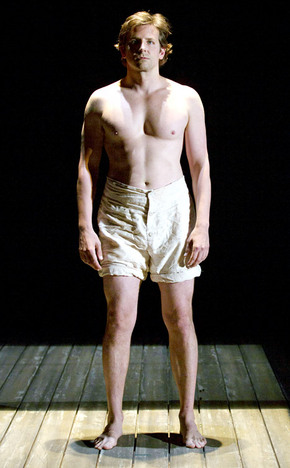This month we feature athlete, advocate, fashionista and art world darling, Aimee Mullins.
"I'm not an advocate for disability issues. Human issues are what interest me. You can't possibly speak for a diverse group of people. I don't know what it's like to be an arm amputee, or have even one flesh-and-bone leg, or to have cerebral palsy."
Aimee first received worldwide media attention as an athlete. Born without fibulae in both legs, Aimee's medical prognosis was discouraging; she was told she would never walk, and would likely spend the rest of her life using a wheelchair. In an attempt for an outside chance at increased mobility, doctors amputated both her legs below the knee on her first birthday. By age two, she had learned to walk on prosthetic legs, and spent her childhood doing the usual athletic activities of her peers: swimming, biking, softball, soccer, and skiing, always alongside “able-bodies” kids.
After graduating high school with honors, Aimee was one of three students in the US chosen for a full academic scholarship from the Department of Defense, and at age 17 became the youngest person to hold a top-secret security clearance at the Pentagon. She worked there as an intelligence analyst during her summer breaks.
It was at this time that she rediscovered her love of competitive sports. While a dean's list student at the prestigious School of Foreign Service at Georgetown University, she set her sights on making the US Team for the 1996 Atlanta Games. She enlisted the expertise of Frank Gagliano, one of the country's most respected track coaches. Through this partnership, she became the first amputee in history, male or female, to compete in the NCAA, doing so on Georgetown's nationally-ranked Division I track team. Becoming the first person to be outfitted with woven carbon-fiber prostheses that were modeled after the hind legs of a cheetah, she went on to set World Records in the 100 meter, the 200 meter, and the long jump, sparking a frenzy over the radical design of her prototype sprinting legs. The essential design of those legs are now the world standard in sports prosthetics.
After a profile in Life magazine showcased her in the starting blocks at Atlanta, the world took notice. Aimee soon landed a 10-page feature in the inaugural issue of Sports Illustrated for Women, which led to her accepting numerous invitations to speak at international design conferences. This introduction to a discourse relating to aesthetic principles fueled her interest in issues relating to body image, and how fashion advertising impacted societal notions of femininity and beauty. In 1999, Aimee made her runway debut in London at the invitation of one of the world's most celebrated fashion designers, Alexander McQueen.
Walking alongside the supermodels of the world, Aimee's groundbreaking, triumphant turn captured the attention of the fashion media, propelling her onto the magazine covers of ID and Dazed and Confused. After making her mark in such fashion magazine standards as Vogue, Harper's Bazaar, W, Glamour, and Elle, she was also named as one of People magazine's "50 Most Beautiful People in the World." In February 2011, she was named as the new Global Brand Ambassador to the world's largest beauty brand L’Oreal Paris, another cultural milestone.
An influential voice in today's culture, she is regularly invited to share her ideas at various corporations and global conferences like TED and TEDMED, and she has been named as one of Esquire's "Women We Love," one of Jane magazine's "10 Gutsiest Women," one of Sports Illustrated's "Coolest Girls in Sport," and was celebrated as the "Hottest Muse" in Rolling Stone's annual Hot List. In addition to her professional career, Aimee serves on numerous boards and spends much of her time assisting various non-profit organizations, most notably the Women's Sports Foundation (WSF). After serving as a Trustee for the WSF, founded by Billie Jean King, she was elected as the foundation's President, a position she stewarded from 2007 to 2009. Aimee served for years as Vice-President for J.O.B., the nation's oldest non-profit employment service for persons with disabilities, founded in 1947 by Eleanor Roosevelt, Orin Lehman, and others. She is a founding member of the Leadership Board to SPIRE Institute, the world’s largest and most diverse athletic development center.
Already at a young age, Aimee's impact on modern society and her influence on future generations is undeniable. Her likeness has been immortalized in exhibits at institutions such as the Smithsonian, the Metropolitan Museum of Art, the NCAA Hall of Fame, the Victoria and Albert Museum, the Tate Modern, the Track and Field Hall of Fame, and the Women's Museum, where she is honored for her contribution to sport among the "Greatest American Women of the 20th Century."

 RSS Feed
RSS Feed